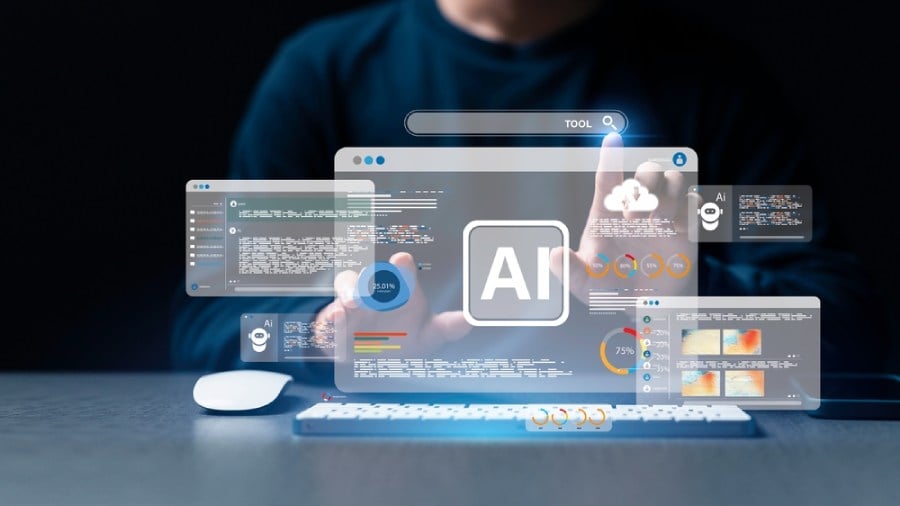
Artificial Intelligence (AI) has grown from a perceived gimmick to a game-changing necessity for competitive businesses. From small start-ups to large corporations, new and exciting applications of AI for business continue to emerge as the technology develops, as well as the knowledge and experience of its users.
Generative AI models are the most widely incorporated in business currently. Generative AI uses machine learning and identifies patterns within massive existing data sets to generate new/original content, such as text, audio or imagery.
However, the potential applications of AI for business are much more significant than simply generating text or pictures.
Customer service and support
Customer support demands are continually evolving. When a business is online, it doesn’t close for the day. People still buy at all hours and, more and more, people want prompt and helpful support during these periods too.
Generative AI can power customer support chatbots to answer customer queries when human support staff is unavailable. The chatbots can comprehend and respond to text inputs from users, making them an ideal solution for providing 24/7 support that can handle simpler, more routine enquiries. Human resources can then be reallocated to more complex queries.
Marketing and content creation
Some of the highest-profile early examples of generative AI applied to business were in a marketing and communications capacity. After all, creating content, such as website copy or blogs, can be a time-consuming task. Generative AI can assist with this process, from content ideation to topic research and even the production of full articles or web pages.
The quality of AI-generated content is a topic of fierce debate in the marketing community, and handing the reigns over to AI entirely is generally not recommended in its current state. However, with the right balance of AI and human involvement, AI assistance can save time, fill gaps, and provide a cost-effective solution to marketing needs.
Remember, AI complements human creativity; it does not replace it. It may also struggle to convey more complex information or information that changes frequently.
Data augmentation
A more technical application of generative AI, data augmentation, is a handy tool. Generative AI can create synthetic data similar to real-world data (this can be especially useful when real-world data is particularly challenging or expensive to collect.). It can also assist with missing data imputation, anomaly detection, and data adaptation into different formats.
Financial analysis
There is enormous potential for AI to be applied to the financial analysis needs of a business. From data processing and cleansing, forecasting and predictive analytics to risk assessment, automated report generation, and fraud detection, generative AI can assist financial analysts by automating routine tasks, providing advanced analytical capabilities, and uncovering valuable insights in complex financial datasets.
Product design and prototyping
Generative AI can provide valuable product design and prototyping assistance by streamlining creative and iterative processes. This includes brainstorming and creative ideation for product design, analysing existing designs and market trends, generating design variations based on initial concepts, rapid prototyping, and analysing performance data generated by product simulations.
It is essential, however, to recognise that AI is best suited to complement human expertise, not replace it. Best results will likely be achieved when designers collaborate with AI systems to improve efficiency and cost-effectiveness while maintaining overall creative control.
Language Translation
Translation tools, such as those found in search engines, are known for failing to grasp languages' nuance, context and idiosyncrasies. The result can be clumsy translations that do not effectively communicate the right messages to speakers of different languages.
Generative AI can be used to more accurately translate important information into different languages, with a greater emphasis on consistency and tone. AI can even generate foreign language overdubs for videos and podcasts.
AI-generated imagery and video
Generative AI can create photorealistic images, videos, branded animations, and graphics. AI is proving highly beneficial for businesses in the creative space looking to automate some of their media production. Professional or stock photography can be expensive and creatively restrictive, whereas AI can generate just about anything you can imagine.
However, AI image and video generation is a developing technology that requires detailed and carefully engineered prompts to work effectively and deliver the creatives you want.
Computer and web programming
Software and web programming are specific, highly technical skills that require years of experience to deliver consistently. AI is not a substitute for a dedicated website developer, software programmer, or another coding-based skill. However, AI can help software developers generate code snippets and assist in code completion, improving productivity and code quality.
ConclusionGenerative AI is a powerful tool, but it works best when it complements rather than replaces human creativity and reasoning. It is an excellent way to enhance content generation and other tasks, but human creativity remains an invaluable differentiator. There are also some ethical concerns with the use of Generative AI, particularly concerning the misuse of AI-generated content, privacy, and bias in AI algorithms. Businesses must ensure they use AI responsibly, ethically, and in a way that is helpful to people, whether their customers or staff. If you are exploring ways generative AI could help your business grow, the Genus team can help you build a modern, bespoke plan to bring this exciting new technology into your business operations, enhancing performance and decision-making without compromising quality, care or your company’s values. |

Alicia Williams
I am the Director of the Genus team at Shorts, a chartered certified accountant and Xero specialist. I specialise in cloud-based accounting solutions, particularly Xero and add-on software, helping clients streamline processes and improve efficiency. As a Client FD, I work closely with businesses to give them a clear understanding of their current position and support their long-term planning and growth.
View my articles